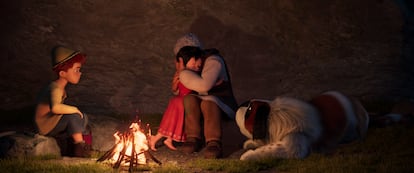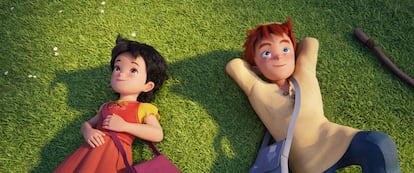Heidi moves from Japan to Spain

The story , conceived by Swiss writer Johanna Spyri in 1880, is well-known (but here's a summary just in case): Heidi is an orphan girl who lives with her aunt. A job opportunity in Frankfurt leads her to leave her with her grandfather, a hermit who lives in the Alps. There she befriends Peter, a young shepherd, and his blind grandmother. Little by little, her granddaughter's tenderness and joy soften the old man's character. However, over time, her aunt takes Heidi to Frankfurt to keep Clara Sesemann company, a sick girl who cannot walk. Although at first Heidi suffers from the strict Miss Rottenmeier and from homesickness, she manages to transmit her kindness to everyone around her. Finally, she returns to the Alps. There she receives a visit from Clara. The joy and love of the mountains will work one last miracle: returning Clara's ability to walk.
If this sounds familiar and you've felt a twinge of nostalgia, you may have been one of those left deeply affected by the Japanese animated series Heidi, both in its first airing in 1975 and in the reruns that have followed over the years. Or in the various versions that have been made, both animated and with live-action actors . 3Doubles Producciones, a studio based on the island of Tenerife, 12,500 kilometers from Tokyo, is the latest company, in conjunction with German studio 100, to return to the story of the little Swiss girl in Heidi: The Lynx Rescue , a Spanish-German production that opens in theaters this Friday. This time, Heidi receives an invitation from her friend Clara to spend the summer at the Baltic Sea. Everything changes when she finds an injured lynx cub and decides to nurse it back to health. Behind this chance event is a greedy businessman who intends to build a large sawmill in the mountains, so he sets lynx traps. It's an adventure film that "remains faithful to the spirit of the classic" while telling a completely new story, explains Darío Sánchez, CEO of 3Doubles.

This time, it's no longer a series of hand-drawn illustrations. Despite this, the creators have tried to maintain the essence. "We tried to make it as faithful to the original as possible," says Sánchez. "The animators studied the original series and, to mention a curious fact, they even respected the way Heidi holds the spoon." What's more, the film even features the classic song "Abuelito, dime tú ," albeit in a new version performed by Canarian singer Cristina Ramos.
In fact, the work began with the German studio Studio 100 International, which owns the intellectual property rights to Heidi and is a shareholder in 3Doubles. “They signed us in December 2023, although they later asked us to change it to a co-production. We thought: 'It's Heidi, we have to get involved no matter what.' And they did. The deadline was tight: “We had to finish it by the end of 2024, so it was a bit of a race against time, with no time to ask for grants.”
When they arrived, the script was ready, as was the animatic (an animated storyboard used to preview a film or sequence), and modeling (creating three-dimensional objects) had begun. "From there, we took on rigging [creating an internal structure or skeleton for a 3D character or object], layout [composing sequences], animation, and fabric simulation, among other things," explains Sánchez.

3Doubles established itself in the Canary Islands eight years ago, taking advantage of the Canary Islands Special Zone (Zona Especial Canaria). Digital arts companies recover between 45% and 54% of their production costs and pay just 4% corporate tax on their profits, among other privileges. Lack of time and the need to carry out the project with their own funds and loans led the production company, however, to relocate more than half of the production to the Basque Country. To this end, it created a subsidiary, Sumendi Uhartea (volcanic island in Spanish), through which it received a 70% tax deduction on total costs granted by the Provincial Council of Vizcaya , among other benefits. "We are still a Canarian company," Sánchez points out.
However, it is no longer unusual for the archipelago to develop a project of this size. Since founding its company eight years ago, 3Doubles has been nominated twice for a Goya ( Inspector Sun and SuperKlaus ). In February, another Tenerife studio won the Goya for Best Animated Feature Film for Mariposas negras . And up to twenty companies have set up shop on the islands: the French company Atlantis Animation ( Tara Duncan and the Leo Messi series for Sony and Disney ); Gigglebug, a Finnish studio that produced the Batman series for Warner Bros. and 101 Dalmatians for Disney; B-water Studio, one of the first to land on the islands; Tomavisión ( Space Jam 2 ); Amuse Animation, Mondo TV, Flaming Frames and 22 Dogs . Or the French studio Fortiche, which produced Arcane , Netflix's most-watched series of 2022, based on the video game League of Legends and which won seven Annie Awards .
“We came for the tax advantages,” admits Darío Sánchez, “but it was a great choice on a personal level.” He does, however, warn of two problems on the islands. The first is training: “ There aren't enough schools in the Canary Islands , to the point that we've had to set up our own campus.” The second, of course, is housing. “It's increasingly difficult to live here, and that also limits our ability to bring in senior workforce to make up for the lack of qualified talent.”
After Heidi, 3Doubles is finishing the animation for Gungo , a film based on a caveman Olympic Games. “A powerful one we're working on is Flamingo Flamenco , about a flamingo colony in Fuente de Piedra, Andalusia. We think it's going to surprise many.” And more Japanese nostalgia: they're working for Studio 100 on Arnie & Barney, a spin-off starring Maya the Bee's soldier ants.
EL PAÍS




